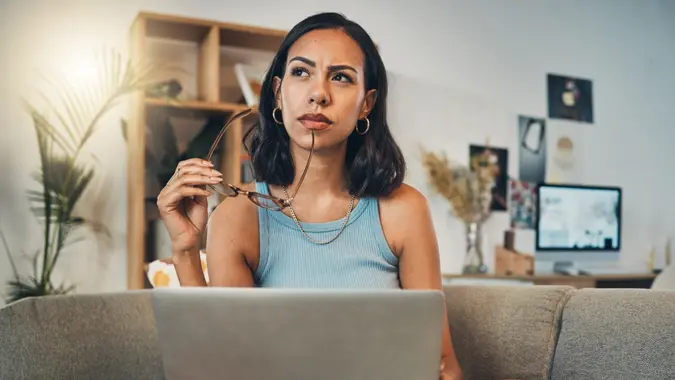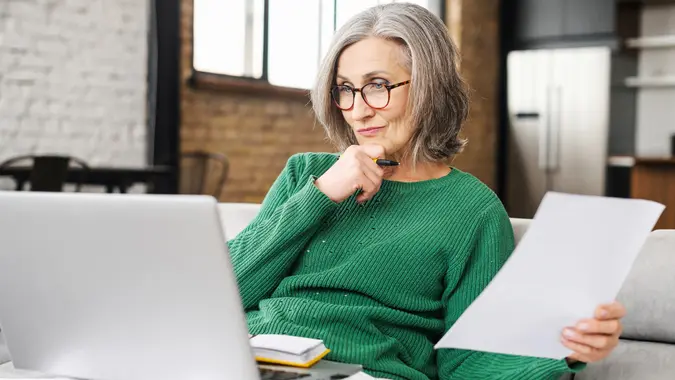What Is Credit Monitoring and Do You Really Need It?

Commitment to Our Readers
GOBankingRates' editorial team is committed to bringing you unbiased reviews and information. We use data-driven methodologies to evaluate financial products and services - our reviews and ratings are not influenced by advertisers. You can read more about our editorial guidelines and our products and services review methodology.

20 Years
Helping You Live Richer

Reviewed
by Experts

Trusted by
Millions of Readers
Your credit score is an important part of your financial life. It determines whether you can borrow money and how much you pay when you do.
Monitoring your score can help you fight fraud, correct errors and better manage your accounts. But you’re probably wondering — what is credit monitoring? It’s a service that provides updates about your credit, and there are various types.
Here’s everything you need to know about credit monitoring and how to decide if you need it.
What Is Credit Monitoring?
Credit monitoring companies track changes to your credit report and provide alerts when something new appears. The service provides information about your score but doesn’t improve or change it.
It’s an easy way to stay informed about your credit score, and many companies offer the service for free.
Quick Tip
Still confused? Think of credit monitoring as grades on essays or tests in school. Your grades on assignments help you know where you stand, so your report card at the end of the term isn’t a surprise.
Credit monitoring gives you updates about your score throughout the year, so there are no surprises on your credit report.
Credit monitoring services provide information about the following changes on your credit report:
- New credit inquiries: You’ll get information about new credit applications for loans and credit cards. These alerts can help you fight fraud because you’ll know if someone else applied for an account in your name.
- New accounts in your name: Get alerts when there’s a new account in your name.
- Missed payments: Once a lender reports a missed payment to the credit bureaus, it shows on your report. This information can help you avoid forgotten payments on old accounts.
- Changes to your credit score: When your score changes, you get an alert. This helps you track your score and stay informed.
- Updated personal information: The services report changes to personal information like your address.
Keep in mind that credit monitoring services only report changes once they appear on your credit report — typically 30 days or more after the activity occurs.
How Does Credit Monitoring Work?
You can sign up for a free credit monitoring service, usually through your bank or credit union, or you can pay for it. Paid credit monitoring might include more features like identity theft protection and dark web monitoring.
Both paid and free credit monitoring services check your credit report at the three credit bureaus — Experian, Equifax and TransUnion. Some services might only check one or two credit bureaus, but the more robust options check all three.
The company sends an alert by email, app or text once something changes with your score. If nothing changes, you get an alert that states things are the same.
The biggest perk of credit monitoring is that it informs you about errors and fraud. As soon as you get an alert about an action you didn’t take, you can take action to fix it.
For example, let’s say you get an alert about a new line of credit. You haven’t applied for a loan or credit card in over a year, so you know it’s fraud and report it to the credit bureaus.
What Credit Monitoring Does and Doesn’t Do
Credit monitoring is a helpful tool, but it doesn’t do everything. Here’s what you can expect when you sign up for the service.
| Feature | Does Credit Monitoring Help? |
|---|---|
| Alerts you to changes | ✅ Yes |
| Tracks your credit score | ✅ Yes |
| Fixes mistakes on your report | ❌ No, you have to fix errors yourself |
| Prevents identity theft | ❌ No, but it helps you catch theft faster |
Good To Know
Experts often compare credit monitoring to a security camera. It informs you about what’s happening but doesn’t fix the problem. You have to fix it yourself.
Why Is Credit Monitoring Important?
Credit monitoring is crucial because it helps you act fast. You need to know about issues so you can dispute credit errors.
Here are some of the biggest perks of credit monitoring:
- It helps you catch identity theft earlier.
- It alerts you if there’s new credit in your name, even if you didn’t apply for it.
- Monitoring allows you to track your credit score and make changes if it decreases.
- The service sends alerts about missed payments when the lender reports it to the credit bureaus.
- Credit monitoring ensures you’re doing everything possible to protect your credit score, rebuild credit or prepare for a large purchase.
Free vs. Paid Credit Monitoring
You can choose between free or paid credit monitoring services. The best option depends on what you need.
Here’s how to decide which one makes the most sense.
| Type of Monitoring | What You Get | Benefits | Examples |
|---|---|---|---|
| Free | Basic alerts like new accounts or hard inquiries | -No cost -Easy to use -Quick sign up |
Credit Karma, Experian free plan, CreditWise, Credit Sesame |
| Paid | Detailed monitoring and identity theft protection | -Identity theft protection -Dark web monitoring -Frequent updates |
Identity Guard, LifeLock, Experian Premium, myFICO |
Who Should Use Credit Monitoring?
Credit monitoring is a solid option for anyone who wants to stay informed about their credit score and protect against identity theft. Signing up for the service is easy, and there are countless free options if you don’t want to pay.
The services are especially helpful when preparing for a big purchase, like a car or home, because they help you monitor your score to get the best deal on a loan.
Credit monitoring is also essential if you’re building credit, repairing your score, or recovering from identity theft.
How To Choose a Credit Monitoring Service
Most credit monitoring companies have similar features, but some differences exist. Before signing up with a company, ensure it offers the following features.
- Complete coverage: Some credit monitoring companies only track changes from one or two credit bureaus. Look for a company that provides updates from all three — Experian, TransUnion and Equifax.
- Score tracking: You want regular updates about your score. Make sure you get them at least once a month.
- Helpful explanations: Make sure the company explains changes to your score so you can understand what’s happening. Most companies provide an in-depth breakdown of the factors impacting your score.
- Affordable pricing: Credit monitoring is usually cheap or free. Compare pricing to find the best deal, or opt for a free version to save money.
Did You Know?
Your bank, credit card or credit union might offer free credit monitoring. Check with your financial institutions before paying for coverage.
FAQ
Credit monitoring helps you protect against fraud and identity theft. It also helps you stay informed about your credit score. Take a look at common questions about the service.- What is credit monitoring and how does it work?
- Credit monitoring companies provide updates about your credit report -- new accounts, missed payments and changes to personal information. The alerts are quick and accurate, allowing you to fix errors and report fraud as it occurs.
- Is credit monitoring the same as credit repair?
- Credit monitoring isn't the same as credit repair.
- Credit repair is when you take steps to improve your credit score, usually by reporting errors or hiring a company to help you.
- Credit monitoring, on the other hand, provides information about your score but doesn't help you fix it.
- Some credit reporting companies also offer credit repair services.
- Can credit monitoring stop identity theft?
- Credit monitoring doesn't stop identity theft. It informs you about changes to your credit profile, which makes it easier for you to fix it. Companies that charge a fee for credit monitoring usually include identity theft protection, which offers more monitoring and might help you resolve issues.
- What's the best free credit monitoring service?
- The best free credit monitoring service depends on what you need. Companies like Credit Karma, Experian and Credit Sesame offer free monitoring. You can also sign up for free monitoring through most banks and credit cards.
- For example, Capital One provides customers with CreditWise monitoring. Check with the bank before you open an account.
Our in-house research team and on-site financial experts work together to create content that’s accurate, impartial, and up to date. We fact-check every single statistic, quote and fact using trusted primary resources to make sure the information we provide is correct. You can learn more about GOBankingRates’ processes and standards in our editorial policy.
- Consumer Financial Protection Bureau. "List of consumer reporting companies."
- Federal Trade Commission. "Fixing Your Credit FAQs."
- Consumer Financial Protection Bureau. 2020. "What is a credit monitoring service?"
 Written by
Written by  Edited by
Edited by 






















